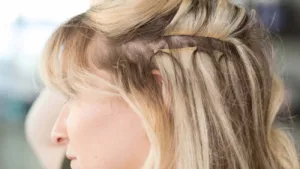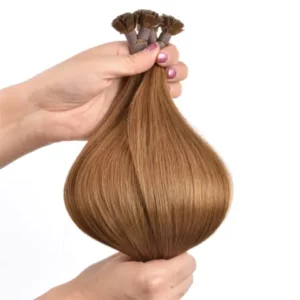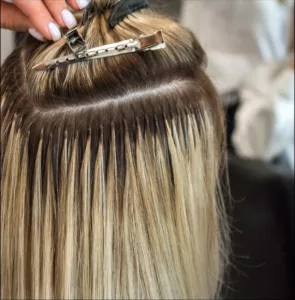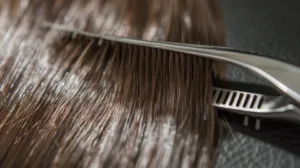Clients love tiny, discreet bonds. Poor care makes them slip or tangle. Great care keeps them soft, secure, and invisible.
To look after nano hair extensions, cleanse gently, avoid oils at roots, brush from ends upward, secure hair for sleep, dry roots fully, and book timely move-ups. Good daily habits protect bonds and extend wear.

This guide explains what nano extensions are and gives a full salon-grade aftercare system: daily care, don’ts, move-up timing, washing, sleeping, and drying. Share it with clients and new assistants to standardize results.
What are nano hair extensions?
Clients hear “nano” and expect zero feel. You must define the method first. Clear structure prevents wrong expectations.
Nano hair extensions use tiny metal or copper nano rings to attach keratin-tipped strands (nano tips) to small sections of natural hair. No glue or heat is used. The bond is discreet, lightweight, and movable during maintenance. Correct bead size and sectioning decide comfort and longevity.
Dive deeper
How the system is built
- Nano tip: A slim keratin tip with a micro filament or wire core that fits inside a nano ring.
- Nano ring: Very small ring (often 2–3 mm outer diameter) lined or unlined. It compresses gently to anchor the strand.
- Sectioning: A tiny, clean section of client hair threads through the ring with the tip before crimping.
- Tools: Loop tool for threading, pliers for crimping and opening during maintenance.
Why stylists choose it
- The bonds hide well in fine hair and around face frames.
- There is no adhesive, so removal is simple and clean.
- Placement is modular, so you customize density and color strand by strand.
| Component | Function | Pro Tip for Pros |
|---|---|---|
| Nano tip strand | Carries extension hair | Match tip hardness to ring type for grip |
| Nano ring | Anchors strand + natural hair | Size must match section and tip diameter |
| Loop tool | Threads hair and tip into ring | Replace wire loops often to avoid fray |
| Pliers | Crimps ring securely | Use flat-smooth jaws to avoid ring damage |
Great nano work starts with correct bead choice, correct tension, and consistent section sizing. The rest is maintenance.

How to look after nano ring hair extensions?
Clients want simple rules. Too many steps cause confusion. You need a short daily routine and clear guardrails.
Care for nano rings with four anchors: cleanse roots gently, nourish mid-lengths and ends, brush from ends up twice daily, and protect hair during sleep and workouts. Keep products light at the scalp to protect grip.
Dive deeper
Daily routine (five minutes)
- Morning brush: Use a loop or boar-mix brush. Start at ends, move to mid-lengths, then near bonds.
- Day protection: Tie a loose low pony or braid before the gym, windy commutes, or helmet use.
- Night prep: Brush, apply a pea-size serum on ends only, then braid or use a silk scrunchie.
Wash day rules
- Frequency: 2–3 times per week for most clients.
- Shampoo: Sulfate-free, lightweight formulas. Massage between rows, not on rings.
- Conditioner: Mid-lengths to ends only. Keep 3–5 cm away from bonds.
- Rinse: Rinse well to remove residue that can travel to rings.
Product map
| Zone | Allowed products | Avoid |
|---|---|---|
| Scalp / bonds | Gentle shampoo, scalp tonic (alcohol-free) | Oils, heavy silicone serums, dry oils |
| Mid-lengths | Light conditioner, leave-in spray | Heavy masks that creep to roots |
| Ends | Serum, cream, heat protectant | Undiluted oils before heat styling |
Consistent light care keeps bonds clean and hair supple. Heavy products near bonds are the main cause of slipping and build-up.
What not to do with nano extensions?
Bad habits break bonds fast. One shortcut can undo a full install. Give clients a clear “no” list.
Do not apply oils on roots, do not rip through tangles, do not sleep with wet hair, and do not skip maintenance. Avoid high heat on rings, tight topknots, and salt or chlorine exposure without protection.
Dive deeper
High-risk behaviors and fixes
- Root oils and dry oils: They migrate into rings and reduce friction.
Fix: Keep treatments from mid-lengths down. Wipe off any scalp contact. - Wet sleeping: Wet cuticles snag and matte around bonds.
Fix: Dry roots 100% before bed and braid loosely. - Tight up-dos: Excess tension on a few bonds causes strain.
Fix: Alternate partings and use soft scrunchies; avoid high, tight styles daily. - No detangling plan: Skipping brushes leads to webbing at the nape.
Fix: Two brush sessions daily; add a quick finger-detangle after workouts.
| Don’t | Why it hurts | Simple alternative |
|---|---|---|
| Oil at the scalp | Ring slippage | Ends-only serum |
| Sleeping with wet hair | Matting around bonds | Cool blow-dry at roots + braid |
| Pulling tangles from the root | Breakage at bonds | Hold above knot, detangle from ends |
| Daily high buns | Localized traction | Rotate styles: low pony, mid bun, braid |
Your no-list protects both the client’s hair and your install reputation.

How often do nano extensions need to be moved up?
Clients forget timelines. Late move-ups cause matting and stress. Clear schedules prevent repairs.
Move nano extensions up every 6–8 weeks for average growth. Fine, fast-growing, or active clients may need 4–6 weeks. Plan earlier windows for swimmers, heavy sweaters, and rapid growers.
Dive deeper
Why timing matters
- New growth gap widens and lets shed hairs accumulate, creating loops that tangle.
- Weight distribution changes and strains small sections.
- Aesthetics suffer as bonds drop and peek through part lines.
Scheduling framework
- Standard: 6–8 weeks, most clients.
- Fine hair / heavy activity: 4–6 weeks.
- Low activity / slow growth: Up to 8 weeks, not longer.
| Profile | Move-up cadence | Notes |
|---|---|---|
| Fine, oily scalp | 4–6 weeks | Smaller sections, extra bond checks |
| Normal density | 6–8 weeks | Default cadence |
| Athlete / frequent swimmer | 4–6 weeks | Chlorine/sweat shorten wear; add braid protocol |
| Slow grower | ~8 weeks | Inspect for tangles; do not exceed 8 weeks |
Pre-book the next visit at checkout. A scheduled cadence is the cheapest insurance against matting.
Can I wash my hair every day with nano extensions?
Some clients love daily washes. Daily washing is possible but not ideal for bonds and color.
Yes, you can wash while wearing nano extensions, but do not wash every day. Daily washing softens natural sebum balance, increases friction around rings, and shortens wear time. Aim for 2–3 wash days per week.
Dive deeper
Why less frequent washing helps
- Bond stability: Fewer wet/dry cycles mean less micro-movement at rings.
- Color retention: Tones and gloss hold longer with reduced shampooing.
- Cuticle health: Natural oils protect mid-lengths and ends between washes.
If a client must wash daily
- Use a very gentle, sulfate-free shampoo.
- Cleanse scalp only; let suds run through lengths.
- Apply conditioner mid-lengths down.
- Finish with a cool rinse for cuticle lay.
- Dry roots 100% after each wash.
| Habit | Better choice |
|---|---|
| Daily hot showers | Warm water, shorter duration |
| Heavy conditioner high | Conditioner from ear level down |
| Air-dry roots daily | Blow-dry roots cool/medium to 100% dry |
Less washing protects bonds and keeps hair glossy. When daily washing is a must, technique matters more.

How to sleep with nano hair extensions?
Night is when friction strikes. Good sleep habits prevent tangles and stress at bonds.
Sleep with nano extensions in a loose braid or low pony using a silk scrunchie. Use a silk or satin pillowcase. Never sleep with wet roots. Brush before bed and in the morning.
Dive deeper
Night routine that works
- Brush ends to roots with a loop brush.
- Apply a pea-size serum to ends only if hair is dry.
- Braid loosely over one shoulder or secure a low pony.
- Switch to a silk pillowcase to reduce friction.
Why it helps
- Less friction means fewer knots around tiny bonds.
- Even tension prevents localized stress at anchor points.
- Better moisture retention keeps ends soft and reduces split ends.
| Sleep factor | Risk if ignored | Simple fix |
|---|---|---|
| Wet roots at bedtime | Matting at bonds | Dry roots 100% before sleeping |
| Cotton pillowcases | Frizz and snagging | Silk or satin pillowcase |
| Loose hair at night | Nape tangles | Low braid or pony |
A two-minute night plan saves 20 minutes of detangling in the morning.

How to dry hair with nano extensions?
Air-drying roots invites tangles. High heat on rings can deform tips. You need a middle path.
Towel-blot gently, detangle, blow-dry roots to 100% on cool or medium heat, then rough-dry lengths. Finish with a brush pass and heat protectant before any hot tools.
Dive deeper
Drying sequence
- Blot with a microfiber towel. Do not rub.
- Detangle ends upward with a loop brush.
- Root dry: Direct airflow down the hair shaft at bonds on cool/medium.
- Length dry: Rough-dry to 90%, then brush smooth.
- Finish: Apply heat protectant mid-lengths to ends before ironing or curling.
Heat boundaries
- Keep hot tools away from rings and tip cores.
- Use moderate temperatures (160–185°C / 320–365°F) on full cuticle hair.
- Avoid repeated passes on the same section.
| Drying step | Purpose | Common mistake | Correction |
|---|---|---|---|
| Microfiber blot | Removes surface water | Rubbing hair in towel | Press and blot only |
| Root blow-dry | Prevents bond swelling/matting | Air-drying bonds | Always dry roots fully |
| Heat style | Polishes cuticle | No heat protectant | Spray mids/ends before hot tools |
Dry roots, gentle tools, and low-to-medium heat keep nano installs smooth and secure.

My opinion
From a manufacturer’s view, nano hair extensions are powerful for fine hair and precision work. They need disciplined aftercare and strict move-up schedules. I recommend full cuticle, single-donor hair, lined nano rings matched to strand size, and clear written aftercare. With that system, clients enjoy invisible bonds, soft movement, and long reuse cycles. Without it, you fight slips, webbing, and premature breakage. Process beats product alone.
FAQ
Do nano rings set off airport scanners?
No. The rings are tiny and typically do not trigger alarms.
Can I use dry shampoo with nano extensions?
Yes, but target the scalp lightly and brush out thoroughly. Avoid heavy residue at bonds.
What brush should I use?
Use a loop brush or soft boar-mix. Start at ends, then mids, then near bonds.
Can I color my roots with nano extensions in?
Yes, with care. Protect rings, avoid flooding bonds with color, and rinse meticulously.
Are nano extensions good for very active clients?
Yes, with tighter maintenance (4–6 weeks) and strict braid + blow-dry-roots routines.
How many strands for a full head?
Usually 150–200 for volume and length, depending on density and head size.
Do nano extensions work on very curly textures?
Yes, if you match curl pattern and install with careful section tension.
Can I use hair oil?
Yes, on ends only. Keep 3–5 cm away from bonds.
Why are my bonds slipping?
Likely oils at roots, thick sections, wrong ring size, or overdue maintenance.
How long does the hair itself last?
Premium full cuticle hair lasts 9–18 months with proper care and routine retipping.
Conclusion
Look after nano hair extensions with light scalp care, ends-focused nourishment, daily brushing, dry roots, gentle sleep protection, and timely move-ups. Good habits protect bonds and keep hair luxurious.
Hibiscus Hair Manufacturer has been dedicated to producing high-quality hair extensions for 25 years and is a recognized leader in the industry. If you are interested in finding a reliable hair extensions supplier and wholesale for your brand, please visit our website for more information:
Nano Ring Hair Extensions





